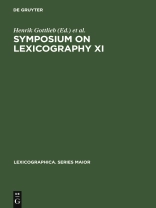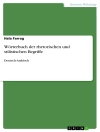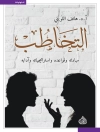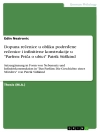Содержание
Contents: Jean Aitchison, Absolute Disasters: The Problems of Layering. — Herbert Ernst Wiegand, Äquivalenz, Äquivalentdifferenzierung und Äquivalentpräsentation in zweisprachigen Wörterbüchern. Eine neue einheitliche Konzeption. — Gertrud Greciano, Phraseographische Prioritäten, erfüllt und unerfüllt. — Andrea Abel/Vanessa Weber, ELDIT — Electronic Learner’s Dictionary of German and English. — Arleta Adamska-Salaciak, A Lexicographical Remake: The Story of the Kosciuszko Foundation (English-Polish) Dictionary. — Richard Almind, Dictionaries through Databases. — Laurie Bauer, The Illusory Distinction between Lexical and Encyclopedic Information. — Steven Berbeco, Alphabetizing the Unalphabetical: The Hungarian Sign Language Dictionary Project. — Henning Bergenholtz, Falsche und richtige lexikographische Definitionen. — Tove Bjorneset, The NORDLEXIN-N Dictionary Project: Part II. — Evelyn Breiteneder/Dmitrij Dobrovol’skij, Specific Problems of Text Lexicography (Fedor Dostoevskij and Karl Kraus). — Ulrich Busse, Beobachtungen und Überlegungen zur Aussprache englischer Wörter im Deutschen und ihrer Repräsentation in ausgewählten Wörterbüchern. — Timothy Colleman, On Representing Verb Complementation Patterns in Dictionaries: The Approach of the CVVD. — John Considine, »Our Dictionaries err in Redundancy«: Past, Present, and Future. — T.P. Dolan, The Compilation of a Dictionary of Hiberno-English. — Ken Faro, Korpuslexikographie und Flexionsmorphologie. — Franziskus Geeb, Perspektiven der Rechneranwendung in der Lexikographie: Lexikographische Datenmodellierung und Datenstrukturierung in relationalen Datenbanken. — Peter Gilliver, Materials and Methodologies for the New Oxford English Dictionary. — Maurizio Gotti, The Evolution of English Canting Lexicography in the 16th and 17th Centuries. — Rufus H. Gouws, Multiple Niching. — Gisela Harras/Kristel Proost, The Lemmatisation of Idioms. — Dieter Herberg, Wissen über (neue) Wörter: Ein Internetwörterbuch entsteht. — Lars Holm, Ein schwedischer Calepinus aus dem 17. Jahrhundert. — Ulf L. Larsson, Semantic Frames as a Tool in Poetry Analysis: The Semantic Architecture of Gunnar Ekelöf’s Poem »A Mölna-Elegy« (1960). — Anne Lise Laursen/Grete Duvå, Cyberlexicography in LSP: New Aspects of Components and Structures in the Dictionary. — Anatoly Liberman, Scandinavian Etymological Lexicography. — Klaus-Dieter Ludwig, Wortschatzentwicklung und Wörterbuch. — Geart van der Meer, On Taboo and Slang in English Pedagogical Lexicography. — Rosamund Moon, Dictionaries and Metaphor, Metaphor and Dictionaries. — Judith Muráth, Wörterbuchbenutzung von Fachübersetzerstudenten. Ihre Erwartungen an ein Fachwörterbuch. — Maria José Pereira de Oliveira, Genre Analysis and the Elaboration of Glossaries. — Gunnar Persson, Dictionaries as Mirrors of Social and Cultural Change. — Heribert Picht, Die Fachwendung in fachlexikographischen Produkten. — Tadeusz Piotrowski, An English-Polish Dictionary for Polish Teenagers: A Dictionary by a Non-Native for Non-Natives. — Santiago Posteguillo Goméz/Jordi Piqué-Angordans, Computer Terminology: Elaboration of the Peter Collin Bilingual English-Spanish Dictionary of Information Technology. — Stefan J. Schierholz, Valenzwörterbücher für Substantive. — Henrik Kohler Simonsen, User Involvement in Corporate LSP Intranet Lexicography. — Wlodzimierz Sobkowiak, Lexicographic Phonetics or Phonetic Lexicography? — Laimute Stankeviciene, English-Lithuanian Lexical Pseudo-Equivalents. A Lexicographical Aspect. — Janusz Stopyra, Dänische substantivische Derivate und ihre deutschen Parallelen im Dansk-Tysk Ordbog. Gyldendal 1999 (11. Ausgabe). — Andrejs Veisbergs, Ideology in Dictionaries. Definitions of Political Terms. — Kadri Vider/Heili Orav, Estonian Wordnet and Lexicography.












